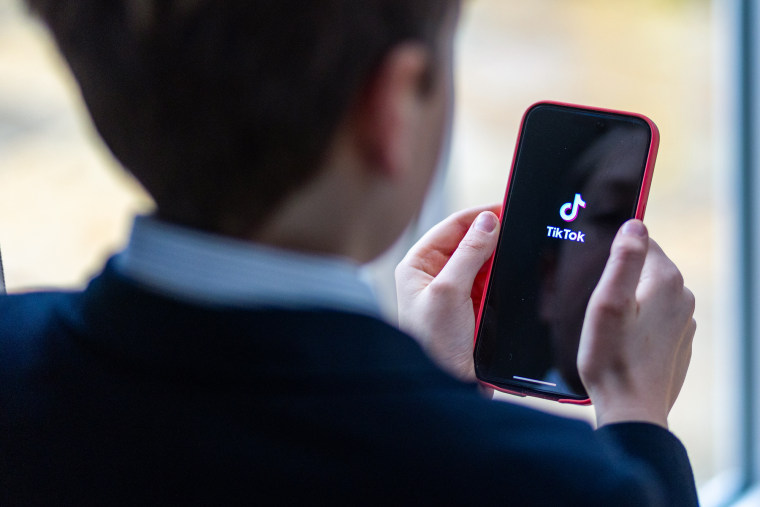House Speaker Johnson plans to package TikTok legislation with critical aid for Ukraine, Israel and Taiwan and send it to the Senate. President Joe Biden vowed to sign it into law.

WASHINGTON — Legislation that could ban TikTok in the U.S. unless it cuts ties with its Chinese parent company is on a path to quickly get to President Joe Biden’s desk and be signed into law.
The bill, which has the backing of Biden and key members of Congress, would allow the administration to ban the popular video-sharing app nationwide if it does not divest from China-based ByteDance within one year.
A similar bill already passed the House in a lopsided, bipartisan 352-65 vote in March. But it has been stalled in the Democratic-controlled Senate, where Commerce Committee Chairwoman Maria Cantwell, D-Wash., had been looking to put her mark on it.
Now, the House plans to package a slightly revised TikTok bill with billions in foreign aid for Ukraine, Israel and Taiwan, all but guaranteeing the potential TikTok ban will become law.
Under the strategy used by Speaker Mike Johnson, R-La., the House plans to pass the combined foreign aid and TikTok package Saturday night and send it to the Senate, setting up a possible vote there as early as next week.
Could TikTok be banned in the U.S. for good?
In recent weeks, Johnson’s team worked closely with the White House on the package, and Biden has already said he will swiftly sign into law the broader package, which also includes other GOP national security priorities, like the REPO Act and sanctions against Iran. Biden backed the original TikTok ban legislation in the House, as well, though his campaign has an account on the app.
Leaders in both parties, as well as national security officials, warn that TikTok is a national security threat. There are worries that the Chinese Communist Party is using TikTok to access data and spy on its American users, spread disinformation and use the app’s algorithms to manipulate elections, like the one in November.
TikTok has argued that the bill amounts to a ban that would violate the First Amendment rights of its millions of U.S. users and harm small businesses that reach customers through the app.
“It is unfortunate that the House of Representatives is using the cover of important foreign and humanitarian assistance to once again jam through a ban bill that would trample the free speech rights of 170 million Americans, devastate 7 million businesses, and shutter a platform that contributes $24 billion to the U.S. economy, annually,” TikTok said in a statement.
Dubbed the Protecting Americans From Foreign Adversary Controlled Applications Act, the House TikTok bill would create a process for the president — through the FBI and intelligence agencies — to designate certain social media applications under the control of foreign adversaries, like China, Russia, Iran and North Korea, as national security threats.
Once an app is deemed a risk, it would be banned from online app stores and web-hosting services unless it severed ties with entities under control of the foreign adversary. The legislation specifically cites TikTok as a target.
The revised TikTok language would lengthen the divestiture period to nine months, up from the original six months, and it would also allow the president to grant an additional, one-time 90-day extension.
That change satisfied Cantwell, the Senate Commerce chair, who had slow-walked consideration of the House-passed bill. She said the change was her recommendation.
“It assures that divestiture will more likely happen, so we think that’s an important part,” Cantwell told reporters Thursday, adding that other tweaks would have to be put off until later.
“They didn’t put other language, and so we could look at things down the road, but for now we support what they’re doing,” she added.
While there is overwhelming bipartisan backing for the bill in both chambers, a handful of lawmakers have argued that it would stifle free speech. Rep. Nancy Mace, R-S.C., introduced an amendment that would strip out the TikTok language.
“Banning TikTok is beating the same drum as other communist countries controlling what content we are able to see,” Mace said last month. “Let’s not give the government any more power to control social media.”
Progressive Rep. Jamaal Bowman, D-N.Y., who has more than 240,000 followers on TikTok, has led the opposition to the ban on Capitol Hill.
“A lot of people on the Hill seem to be ignoring that an outright ban of TikTok would hurt the livelihoods of a lot of working-class people, many of whom are people of color,” Bowman told NBC News.
“We need to protect people’s constitutional rights of free speech and privacy. We need to pass comprehensive social media safety legislation that protects people on all platforms from Big Tech overreach,” he said. “Let’s get to work on that, right now.”
-NBC News










